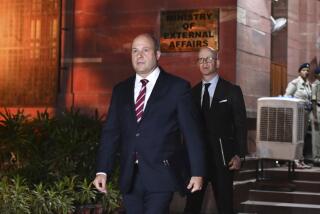Soviets, Japan Trade Ousters of Diplomats : Relations at New Low After Exchange of Spying Charges
- Share via
MOSCOW — Moscow today expelled a Japanese naval attache and businessman and Tokyo kicked out a Soviet trade official in a rapid-fire exchange of spy charges.
The expulsions brought Soviet-Japanese relations to a new low after the disclosure earlier this year of illegal high-tech exports by Japan’s Toshiba Machine Co. to the Soviet Union and alleged spying in Japan involving Soviet officials.
The Soviet Foreign Ministry said it summoned the Japanese ambassador Wednesday and told him that Naval Attache Nobuhiro Takeshima had been involved in spying in the Black Sea port of Odessa.
“It was said that it was impossible for Mr. Takeshima to stay in the Soviet Union any longer,” spokesman Gennady Gerasimov told a news briefing today.
Commercial Secrets Claimed
He said Takao Otani, deputy representative in Moscow of the Mitsubishi Corp., had been ordered to leave for attempting to receive commercial secrets from the Foreign Trade Ministry.
Gerasimov said Otani had also been involved in speculation and breaking laws governing foreigners’ travel in the Soviet Union.
He said a third Japanese--also a diplomat--Air Attache Tomohiro Okamoto, was suspected of spying in Odessa last month but was not being expelled.
There was no immediate explanation why only one of the two diplomats was being expelled. Nor was there any indication Otani was being formally charged with criminal activity, although Gerasimov accused him of violating Soviet laws.
Hostile Campaign
Gerasimov said a note handed at the meeting to the Japanese ambassador condemned what the Foreign Ministry called a hostile campaign by Japan.
Earlier this year, four Soviet diplomats returned home from Tokyo after Japan charged that they were part of a spy network that obtained information about U.S. military aircraft.
Japan today ordered the expulsion of a Soviet deputy trade representative, Yuri Pokrovsky, on grounds he had been involved in industrial spying and had refused to submit to police questioning about alleged Soviet purchases of information stolen from an aircraft instrument maker.
Japan said its action was not in retaliation for the Soviet Union’s expulsion orders, which it said were the first served by Moscow on Tokyo since World War II.
Pokrovsky had been meeting with Minoru Shimizu, director of the Tokyo Aircraft Instrument Co.’s enterprise department, in restaurants and on railway platforms two or three times a month between April 16, 1986, and early July this year, police said earlier.
$69 Million for Information
They said Shimizu was believed to have received a total of about $69 million from the Soviets for the information.
Tokyo Aircraft Instrument was reported to have been producing instruments and fixtures for military planes, including F-15 jet fighters and P-3C anti-submarine patrol planes.
A senior Foreign Ministry official in Tokyo told reporters that the Soviet allegations were groundless and said the Soviet action was regrettable.
More to Read
Sign up for Essential California
The most important California stories and recommendations in your inbox every morning.
You may occasionally receive promotional content from the Los Angeles Times.













